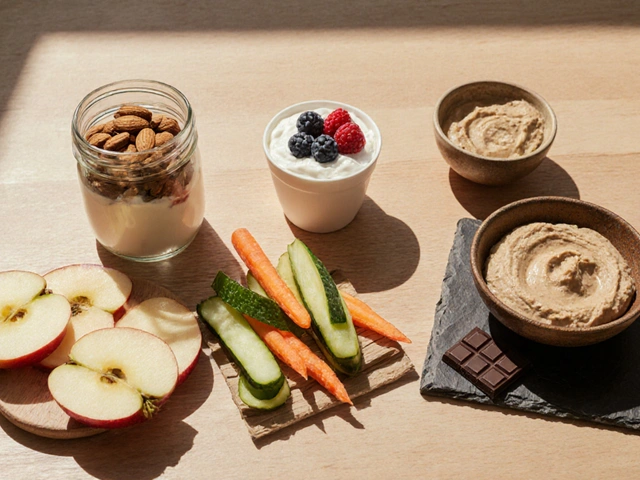
Ever thought about what really makes health goals stick? It's not just about dreaming big but getting smart with how you set them. Specific goals like 'I want to run a 5K in three months' do way better than vague ones like 'I want to get fit.' Why? Because when you know exactly what you're aiming for, it's easier to figure out how to get there. So, next time you're setting a health goal, be as clear and specific as possible.
But hey, just writing them down isn't enough. Your mindset plays a massive role, maybe even more than you think. If you believe in your ability to change, it's like giving yourself a head start. So, ditch any doubts and embrace that inner cheerleader. Remember, how you think can seriously impact what you achieve.
- The Power of Specific Goal-setting
- The Role of Mindset in Achieving Goals
- Strategies for Staying Motivated
- Making Lasting Changes
The Power of Specific Goal-setting
Setting health goals isn't just about deciding we want to feel better or look fitter. It's about outlining exactly what we want and how we're going to get there. Think of it like GPS for your wellness journey: without clear directions, even the best car won't get you to your destination.
Researchers have found that people who set specific goals are more likely to succeed. Why? Because specific goals encourage detailed planning. Instead of saying, 'I want to lose weight,' try 'I will lose 10 pounds in three months by exercising four days a week and cutting out sugary drinks.'
This clarity helps in a few ways:
- Motivation Boost: Knowing exactly what you're working towards gives you a clear vision and a motivational push.
- Progress Tracking: When your goals are specific, you can easily track your progress, which keeps your momentum alive.
- Adjustments Made Easy: If you're not meeting your targets, it's simpler to tweak your plan when you know precisely what needs change.
And here's a cool fact: According to a study on goal-setting, people with specific goals were 42% more likely to feel confident about achieving them. That's a solid reason to get specific.
So next time you're setting those health goals, think about the details. Swap 'exercise more' for 'jog for 30 minutes every morning,' and watch how much more achievable it all feels. This precision isn't just a minor tweak; it can be the game-changer in unlocking your true potential.
The Role of Mindset in Achieving Goals
Ever heard that saying, 'Whether you think you can, or you think you can't – you're right'? It's spot-on when it comes to setting and smashing those health goals. Your mindset is like the steering wheel of your journey. If it's pointing in the right direction, you'll likely get where you want to go faster and with fewer bumps.
Diving into it, the concept of a 'growth mindset' can really change how you view challenges. It's all about believing that your abilities and intelligence can develop with time and effort. When you approach your goals with this mindset, setbacks become just a part of the process, not a dead end.
Research from Stanford University highlights that people with a growth mindset view failures as opportunities to learn and improve. They don't shy away from challenges; they embrace them. This kind of thinking boosts motivation and persistence—critical ingredients for health-related successes.
But how do you get there? Start by recognizing and challenging any negative thoughts that hold you back. Replace 'I can't' with 'I can't yet.' This small shift in language can make a big difference. Also, surround yourself with positive influences. Whether it's a community online or friends who inspire you, they can help reinforce that positive mindset.
If you’re a stats person, take a look at this simple fact: a 2023 survey showed that individuals who consistently engage in positive self-talk are over 30% more likely to achieve their personal growth targets compared to those who focus on negative self-talk. It’s incredible how your perception can actually steer your success!
Remember, your mindset isn't static. Like any muscle, it strengthens with use. The more you practice positive thinking and resilience, the more natural it becomes and the closer you get to achieving those elusive health goals.

Strategies for Staying Motivated
Keeping your health goals on track can sometimes feel like trying to push a boulder uphill. But don't worry—there are some simple strategies to give you that extra push when your motivation starts to wane. First off, tracking progress is key. Whether you scribble in a journal or use an app, seeing how far you've come can boost your spirit like nothing else. It's like giving yourself a high-five for every small victory.
Next, make a plan for rewarding yourself when you hit a milestone. Who doesn't love a treat? Just make sure it's something that fits your overall health goals. Maybe a new workout playlist, or those running shoes you've been eyeing.
Don't forget the power of community. Teaming up with a friend can make all the difference. Sharing goals and having someone to hold you accountable turns solo struggles into teamwork victories. Plus, a little friendly competition never hurt anyone!
Setting reminders can be a lifesaver, too. Whether it's a sticky note on your fridge or smartphone alerts, reminders keep your goals front and center. Outta sight, outta mind, right?
Finally, remember why you started. Always keep your 'why' in mind. Maybe you want to be more active with your kids or improve your mental wellbeing. Whatever it is, focus on that reason, especially when the couch looks way too tempting.
Here's a little extra motivation: a recent study found that people who regularly reviewed their goals were 42% more likely to achieve them! That's some serious encouragement to keep checking in on those objectives.
Making Lasting Changes
Turning your health goals into a lifestyle isn’t just about getting things right in the short term. Lasting changes need a mix of patience, consistency, and often, a bit of trial and error. But don’t worry! Here’s how you can make those changes stick and turn your health goals into lifelong habits.
One key thing is building small habits that grow over time. Think about it like planting seeds. You can’t expect a tree to grow overnight, right? Start with mini-goals, like drinking an extra glass of water each day or adding five more minutes to your daily walk. These small actions add up and make your bigger health goals feel more reachable.
Have you ever heard the saying, "What gets measured, gets managed"? Well, it’s true! Tracking your progress can be a game-changer. Keep a journal or use a fitness app to record your achievements. Seeing your improvements, no matter how small, can give you a confidence boost and help keep your motivation up.
- Celebrate your wins, even the small ones.
- If you slip up, don’t be too hard on yourself. Get back on track the next day.
- Adjust your routine if it’s not working out. Flexibility is key.
Let’s talk about support. Having friends or family who cheer you on can really help. Whether it’s joining a workout group or creating a chat thread that shares tips, these connections can make a big difference. As you work towards those health goals, remember you’re not on this journey alone.
Curious about what science says? A study published in 2020 showed that people who shared their goals with a group and had a support buddy were 45% more likely to achieve them. So, putting yourself out there can really pay off!
Making these changes stick is all about finding what’s enjoyable and sustainable for you. If you love how you’re improving your health, it won’t feel like such a task, making it easier to stick with it for the long haul.





